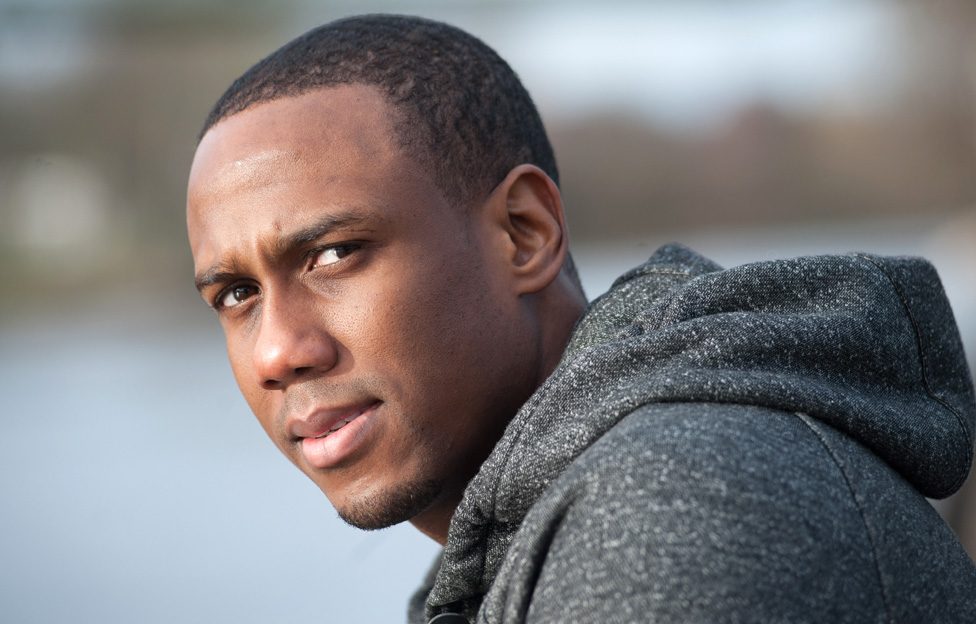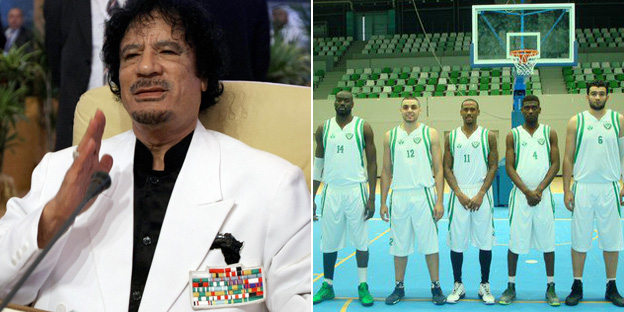
When US basketball player Alex Owumi signed a contract to play for a team in Benghazi, Libya, he had no idea that his employer was the the most feared man in the country. Nor did he guess the country was about to descend into war. Here he tells his story, parts of which some readers may find distressing.
It was a beautiful flat. Everything was state of the art and it was spacious, too. It had two big living rooms, three big bedrooms, flat screens everywhere. The couches had gold trim and were so big and heavy they were impossible to move. The door to the apartment was reinforced steel, like on a bank vault.
It was 27 December 2010 and I had just arrived in Benghazi, Libya’s second biggest city, to play basketball for a team called Al-Nasr Benghazi. I had stayed in some nice places playing for teams in Europe, but this seventh-floor apartment in the middle of town was something else. It was like the Taj Mahal.
I didn’t immediately notice the photographs dotted around the place – of Libyan leader Col Muammar Gaddafi and his grandchildren.
When I did, I phoned the team president – we called him Mr Ahmed – and he told me how it was. “The apartment belongs to Mutassim Gaddafi, the Colonel’s son,” he said. “Al-Nasr is the Gaddafi club. You are playing for the Gaddafi family.”
Gaddafi! When I was a young kid growing up in Africa – I was born in Nigeria – Gaddafi was someone we all looked up to. He was always on the news and in the paper, helping out countries like Niger and Nigeria. I thought of him as one of the faces of Africa – him and Nelson Mandela. As a kid I wasn’t really aware of any of the bad things he was doing. Maybe I was too busy playing sports.

Libyan leader Gaddafi watched Alex (right, centre) and his Al-Nasr team play
In my first practice with my new team-mates there was a weird atmosphere. I asked the other international player on the team, Moustapha Niang from Senegal, “Why does everybody look so depressed?” And he explained it to me. “We’ve been losing,” he said. “They haven’t been getting paid, some of them are getting physically abused. If we don’t win our next game, some of these kids are going to get beat.”
A lot of the players had scratches and banged-up bruises on their arms. One had a black eye he was trying to conceal. Gaddafi’s security goons would push them up against lockers, things like that – and some of these guys were not big athletes like me and Moustapha. During practice you could see some of them were just scared to make mistakes. But in any sport you’re going to make mistakes, you’re going to make bad plays. I can’t go into a game and trust people who are scared.
The next day, we travelled to a game in Tripoli on a private jet like we were a team playing in the NBA [the National Basketball Association in the US]. That’s how it was with Al-Nasr and the Gaddafi family – they got extra funding, extra millions of dollars. But the deal was we were supposed to win – and when we lost, it was a problem.
Col Gaddafi was at that game. Before the start I saw him sitting with his military personnel up in the stands in a white dress uniform. Walking on the court was his son, Saadi Gaddafi, the man in charge of sport in Libya. We spoke and honestly, he seemed like a nice man who just loved sport.
As we were talking, I looked into the stands at his father and we locked eyes. It lasted just a moment, but my team-mates saw it and my fans saw it. We won that game by 10 points and afterwards, in the locker room, Mr Ahmed handed out envelopes, each containing about $1,000 (£600) in dinars. “From our leader,” he said.
After that game I started to get a lot of special treatment around the country because I had been personally acknowledged by the Gaddafi family. I never had to pay for food at the markets or in restaurants again. Everything from socks to a new TV and laptop – I got it all free or on a sort of open-ended loan. I never had to pay anything, not a dime. And after that game, we just kept winning and winning. I was the point guard – the captain, the conductor of the orchestra. We just kept winning and my team-mates weren’t scared any more.
But we noticed that our team coach, Coach Sharif, was often sad during practice. He was Egyptian and was worried about the situation back home – by this time, the revolution there was in full swing. There were rumours that there would be an uprising in Libya, but I never really took them seriously. We’re talking about a country where the leader had been in power for 42 years. Who in their right mind would cross that kind of leadership, that kind of army?
From the roof of my apartment in Benghazi I could see the whole of the city. I liked going up to the roof, especially when I was homesick and missed my family. I could really clear my mind up there.
But on 17 February 2011, at about 09:15 in the morning, I go on to the rooftop and see 200, maybe 300 protesters outside a police station across the street. A military convoy is coming closer and closer. Then, without warning, shots. People running, people falling. Dead bodies all over the ground. I’m praying, praying that this is a dream, that I will wake up sometime soon.
With these bullets flying everywhere, I’m hugging the floor of the rooftop. I am so frightened. So many things are running through my head and I just can’t think straight. After 10 minutes or so, the shooting stops and there is only wailing and screaming.
I go back to my apartment and close the door. I call Coach Sharif. It takes a long time before my call is connected, but eventually he picks up. He tells me that he’s on his way out of the country, back to Egypt, but that I should stay in my apartment and that somebody will come for me.
I try calling Moustapha but there is no connection. Over and over I punch the numbers on my phone, but the networks are down. The internet is down. I sit huddled against a big metal bookcase, praying.
Every now and then I peek out the window. The crowds of men have dispersed. Instead, I see kids, kids I played soccer with on the street. They have turned into rebels now, with their own shotguns and machetes. Regular life is over – it’s every man for himself.
Join the MARCHVEGAS Crowdfund.
[MARCHVEGAS] – noun 1. “March to Vegas” symbolizes the humanistic tendency to march, migrate, or advance as a deliberate or organized body in a habitual manner back to Las Vegas. 2. Marriage of March Madness and Las Vegas, especially during tournament time. 3. The “MARCHVEGAS 4-day™ Holiday” (March 20 – 23, 2014) – Sign the Petition.